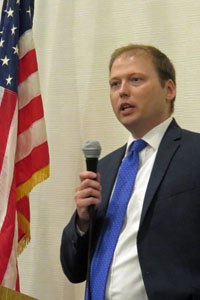
Professor James Todd's Views on the upcoming Supreme Court Term

The Supreme Court begins its next term on Monday, the thirteenth presided over by Chief Justice John Roberts. What can we expect?
Our speaker yesterday, PBAU Professor James Todd, who specializes in American governmental institutions and constitutional law, gave us his perspective.
Professor Todd listed the three areas that he is watching – the actions of new Justice Neil Gorsuch, a set of interesting cases they are likely to take up, and the possibility of resignations in the near future.
Justice Gorsuch, who took office in April and participated in the end of the last session has had an auspicious start. As promised by President Trump, he is very much in the mold of Antonin Scalia – a very conservative jurist. For those cases in which he participated, Judge Gorsuch staked out the most conservative positions, even going so far as to write his own opinion when he thought the majority did not go far enough.
On the travel ban case for example, while the court mostly removed the lower court injunction pending review in the fall, but modified the ban to allow for exceptions, Judge Gorsuch (along with Clarence Thomas) opined that the executive was not to be second guessed by the judiciary on matters of national security. He also strongly affirmed the principal of religious liberty in the Missouri playground case – where a religious school was denied government funding for safety improvements by a lower court. The upcoming session should be interesting to watch.
Upcoming cases that Professor Todd thought would be addressed by the court include:
- The revised travel ban, after it makes its way through the lower court challenges. (The October hearing was canceled since the original ban ended and a modified one has been introduced that addresses some of the initial objections).
- Partisan gerrymandering – do partisan state legislatures have the right to define districts so as to advantage a particular party. He expects that the court may conclude that there is no constitutional issue here – it is all politics and should be addressed at the ballot box rather than the courtroom.
- The Colorado “wedding cake” case – does religious liberty allow a baker to refuse to make a cake for a gay wedding when in conflict with local anti-discrimination laws. The justice to watch in this case is Anthony Kennedy, who has typically been supportive of gay rights in other cases.
- Gender segregated bathrooms
- The Maryland AR-15 ban
- The right to privacy in cell phone records. The court has already decided that a warrant is needed to search the contents of a cell phone, but not the records maintained by the carrier.
- Should school boards be allowed to have a prayer at their meetings? Although the courts have ruled that governmental bodies (eg. city councils) may include a prayer, this issue turns on whether a school board is special because it is part of a school system (where prayer is precluded).
On the issue of retirements, Professor Todd lists the most likely in order as Anthony Kennedy (coming up on his 30th anniversary next year), Ruth Bader Ginsberg (at 84, the oldest justice, but would be loath to let Donald Trump pick her successor), Clarence Thomas, and Steven Breyer.
Please join us for the next meeting on October 25 for Daniel Peterson, Director of the Center for Property Rights of the James Madison Institute.